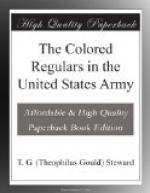In 1824 our young friend fell in with Benjamin Lundy, and in 1828-9, with William Lloyd Garrison, editors and publishers of the “Genius of Universal Emancipation,” a radical anti-slavery paper, whose boldness would put the “National Era” to shame, printed and published in the slave State of Maryland. In 1829-30 the colored people of the free States were much excited on the subject of emigration; there had been an emigration to Hayti, and also to Canada, and some had been driven to Liberia by the severe laws and brutal conduct of the fermenters of colonization in Virginia and Maryland. In some districts of these States the disguised whites would enter the houses of free colored men at night, and take them out and give them from thirty to fifty lashes, to get them to consent to go to Liberia.
It was in the spring of 1830 that the young man we have sketched, Hezekiah Grice, conceived the plan of calling together a meeting or convention of colored men in some place north of the Potomac, for the purpose of comparing views and of adopting a harmonious movement either of emigration or of determination to remain in the United States; convinced of the hopelessness of contending against the oppressions in the United States, living in the very depth of that oppression and wrong, his own views looked to Canada; but he held them subject to the decision of the majority of the convention which might assemble.
On the 2d of April, 1830, he addressed a written circular to prominent colored men in the free States, requesting their opinions on the necessity and propriety of holding such convention, and stated that if the opinions of a sufficient number warranted it, he would give time and place at which duly elected delegates might assemble. Four months passed away, and his spirit almost died within him, for he had not received a line from any one in reply. When he visited Mr. Garrison in his office, and stated his project, Mr. Garrison took up a copy of Walker’s Appeal, and said, although it might be right, yet it was too early to have published such a book.
On the 11th of August, however, he received a sudden and peremptory order from Bishop Allen to come instantly to Philadelphia, about the emigration matter. He went, and found a meeting assembled to consider the conflicting reports on Canada of Messrs. Lewis and Dutton; at a subsequent meeting, held the next night, and near the adjournment, the Bishop called Mr. Grice aside and gave to him to read a printed circular, issued from New York City, strongly approving of Mr. Grice’s plan of a convention, and signed by Peter Williams, Peter Vogelsang and Thomas L. Jinnings. The Bishop added, “My dear child, we must take some action immediately, or else these New Yorkers will get ahead of us.” The Bishop left the meeting to attend a lecture on chemistry by Dr. Wells, of Baltimore. Mr. Grice introduced the subject of the convention; and a committee consisting of Bishop Allen, Benjamin Pascal, Cyrus Black, James Cornish and Junius C. Morel, were appointed to lay the matter before the colored people of Philadelphia. This committee, led, doubtless, by Bishop Allen, at once issued a call for a convention of the colored men of the United States, to be held in the city of Philadelphia on the 15th of September, 1830.




